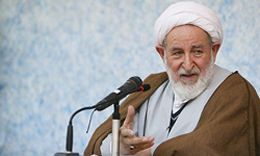 In a thinly veiled reference to nuclear arms, Ayatollah Mohammad Taqi Mesbah Yazdi – a hard-line Iranian cleric who is seen as spiritual mentor of Iranian President Mahmoud Ahmadinejad – has called for the production of those “special weapons’’ that were a monopoly of a few nations. Yazdi wrote in a book circulated among senior clerics that Iran should not deprive itself of the right to produce these “special weapons.’’
In a thinly veiled reference to nuclear arms, Ayatollah Mohammad Taqi Mesbah Yazdi – a hard-line Iranian cleric who is seen as spiritual mentor of Iranian President Mahmoud Ahmadinejad – has called for the production of those “special weapons’’ that were a monopoly of a few nations. Yazdi wrote in a book circulated among senior clerics that Iran should not deprive itself of the right to produce these “special weapons.’’
Yazdi’s book, ‘The Islamic Revolution – Surges in Political Changes in History’, was written in 2005 and then reprinted last year but would have had only a very limited circulation among senior clerics and would not have been widely known. “The most advanced weapons must be produced inside our country even if our enemies don’t like it. There is no reason that they have the right to produce a special type of weapon, while other countries are deprived of it,’’ Yazdi wrote. The ayatollah is a member of the Assembly of Experts, a conservative body of 86 senior clerics that monitors Iran’s supreme leader and chooses his successor. He also heads the Imam Khomeini Educational and Research Institute, an Islamic think tank, in the city of Qom, 80 miles south of the capital.
Iran’s government and its clerical hierarchy have repeatedly denied the country is seeking nuclear weapons. The United Nations Security Council last week imposed a fourth round of sanctions in response to Tehran’s refusal to halt uranium enrichment. The fourth sanctions package includes an asset freeze of 40 additional companies and organizations, including 22 involved in nuclear or ballistic missile activities.
On Monday, European Union foreign ministers agreed on a package of additional sanctions against Iran which go beyond the UN measures. The EU sanctions would focus on trade, especially on dual-use items that could have nuclear applications. They also would further restrict insurance and financial transactions.
The Australian government also imposed sanctions against two Iranian companies and an Iranian general to protest against Tehran's nuclear program. The new measures were in addition to those adopted by the UN Security Council, Foreign Minister Stephen Smith told Parliament in Canberra.








